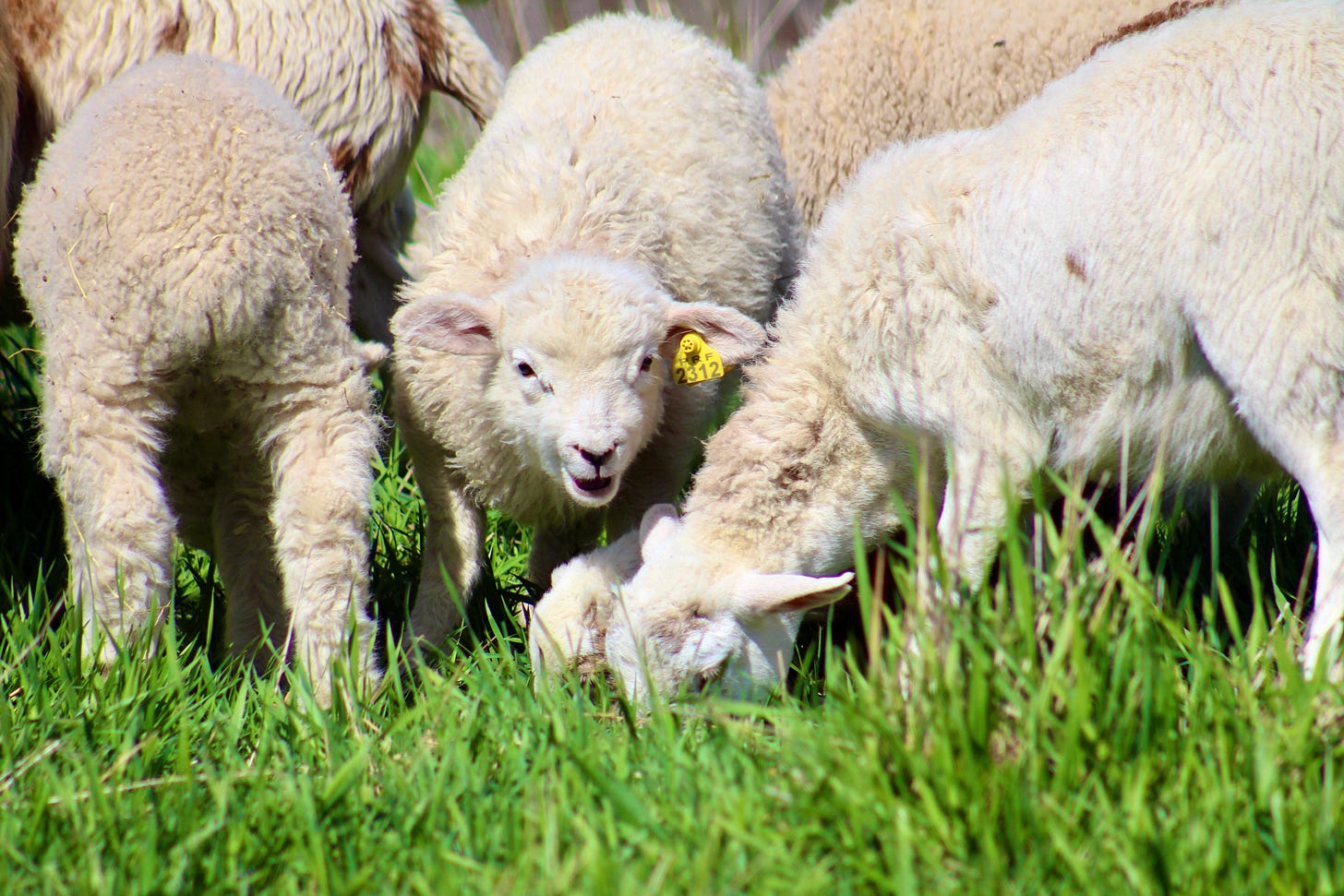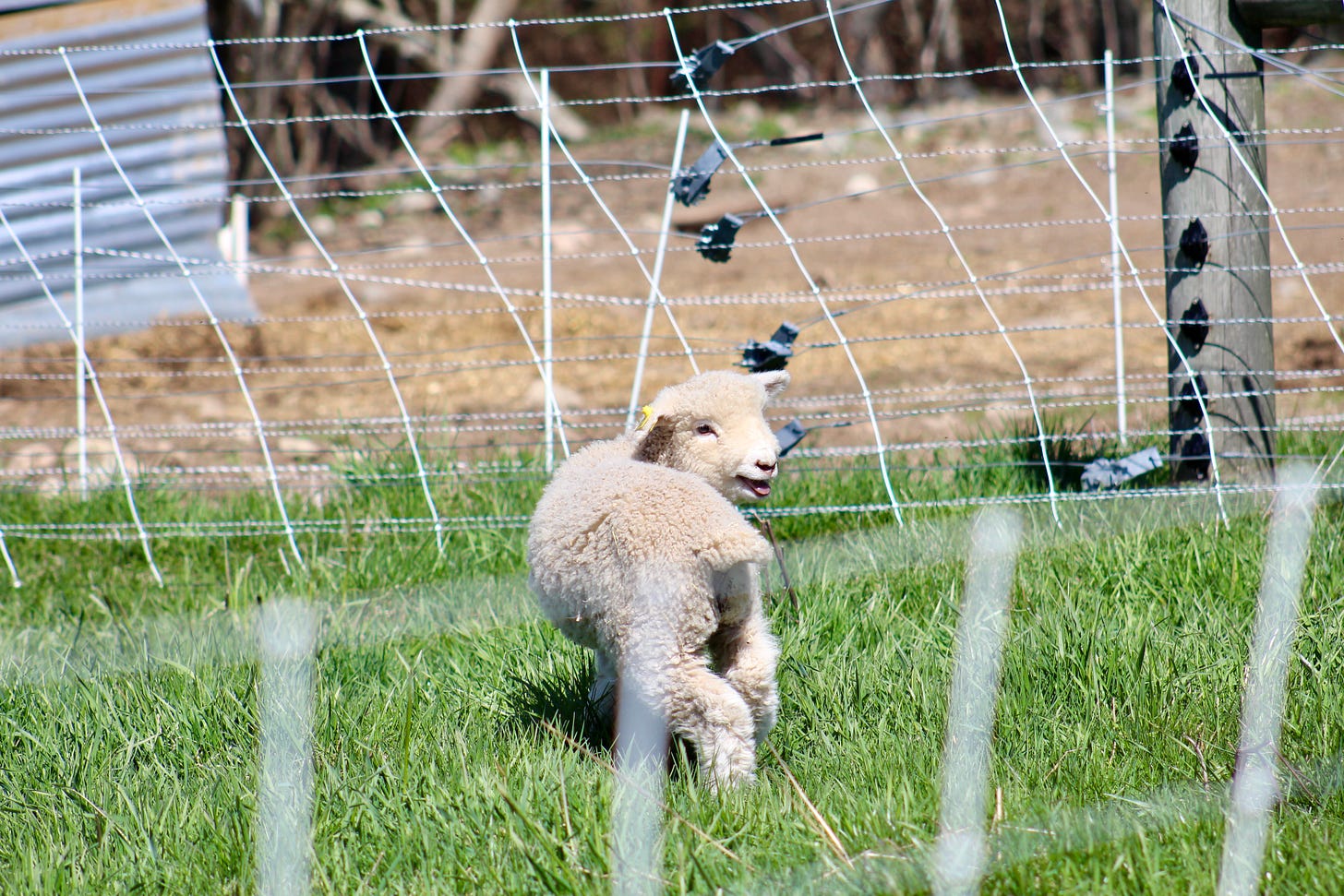Lambs and Community Theater and Resilience
Thanks to a nice and unexpected sobbing bit in the beginning of the month, April has been my month for trying to be a bit more resilient.
And I don’t think I’ve become magically more resilient this month. I know! I know! I’m breaking all the self-help rules. This was not a fast-fix 30-Days to a Whole New Resilient You.
But yesterday for that same news blog that made me want to give it all up (because of the sobbing incident this month), I got to do two things:
I got to see beautiful lambs venture outside into the world for the first time
I got to see the first full run-through of a community theater production.
I wouldn’t have done either of these things if I had given in.
When the lambs were released, one lamb really hesitated before going out to pasture. He looked at the big sky, the light, the people all lined up (an acceptable six feet away from the electric fence) and you could tell he was going, “Nope. Yeah. No way am I going out there.”
Then he glanced at his fellow lambs, frolicking and hopping, chomping away on the fresh grass.
He took a step forward and turned around, back toward the barn. He knew that barn. Yeah, it was dark. Yeah, it was a bit smelly. But he knew it. It was safe in there.
A human came and shook a bucket of food in front of him.
He hesitated. He looked up at his happy friends again and he went out.
People cheered. He tasted the grass and apparently found it pretty good. And then he frolicked, too.
I realized that I was that lamb. Cautious. Worried. Wanting to join in, but afraid of the outcomes.
And at the rehearsal? It was magical for a couple reasons. You could feel how great the musical was going to be. You could feel the way the actors fully embraced the journey of becoming great, how they didn’t quite know some of their lines or blocking or cues yet, but they didn’t hide from it, they just gloriously shouted out, “Line!”
Or just asked.
They gave themselves the grace to be flawed as they learned. They didn’t expect perfection. They expected living—just the state of living.
In a post for Psychology Today, Robert Taibbi writes about Stoicism and anxiety and psychology:
7: Plan for the worst
“This is about anxiety. When you are worried, your mind naturally runs down endless rabbit holes of “what if.” Rather than letting these obsessive thoughts continue to run and torment you, jump ahead. What’s the worst that can happen? Lock in on that, decide what is rational or irrational, and then come up with a game plan to put this worse-case scenario to rest.
“This is an excellent anxiety management tool. By mapping out a plan for your worse-case scenario, you are not only prepared, but can feel more in control — you know what can do if the worse happens, allowing you to mentally push it aside and out of your head.”
For both of our kids, I’ve always said, “What is the worst that will happen? Will you go to jail? Will someone get hurt or die?”
The older kid is a solid no to those things and she’s made it through pretty gloriously.
The younger kid? Not so much. It just makes them visualize the most negative outcomes and then staying there. So, I don’t use this with them any longer, obviously. But I do use it with me.
The lamb probably didn’t do this either, but he did do Taibbi’s next bit of advice from stoicism, which was:
“8: Step back, get perspective
“When faced with most everyday problems, your stress creates tunnel-vision, making the current problem the most important and biggest problem in the world. Stepping back is taking a deep breath, asking yourself what can I control here, but then putting the problem in a larger perspective — that this is first-world, not a third-world, matter-of-life-and-death problem. By doing this you break the tunnel vision, realize everything is not equally a priority even though it may feel so at the time. Another skill to be developed and practiced.”
That lamb took a hot second, looked around, saw his friends were happy, safe, and munching on some primo grass. And then he went out too, knowing that the barn was still there, door open, for him to retreat too.
Resilience is like that, I think. It’s about perspective, worst case scenarios (even when you’re living through them), and baby steps.
We all will be gone someday. But we want to take risks. Walk into the pasture. Step out on the stage. Learn dance steps. Sing at full voice, holding nothing back.
Because it’s the living that matters. Being in those moments and having the fullest, best lives while we’re still here.
LINKS TO LEARN MORE
LINKS FROM ME THIS PAST WEEK
Living Happy Happens Piece By Piece
I hope you don’t mind me sharing this for the extra content this week. I’ve been thinking about this trip and Nena and Kimberly a lot. I helped raise the money for the wheelchairs and I was the official documentarian for the trip. There were a lot of stories like these and they all make me think about humanity and connection. About how there are heroes …
Don’t Let Your Farts or Your Ego Get In Your Way
This brilliant podcast–wink, wink–we talk about how both farts and your own ego can threaten to take over your life if you don’t take some control over their eruptions.
My Mom And Hugging Away The Judgement
My mother spent a lifetime hugging other people. Meeting after meeting, interaction after interaction, for the entire time that she was alive, she would hug people when she saw them and hug them when they left. Her hugs were many. Her hugs were long.










